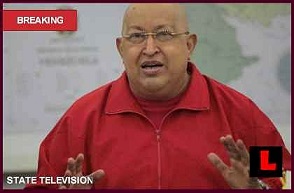Venezuela’s Hugo Chávez dead
After 14 years in power as Venezuela’s president, Hugo Chávez, a former military officer and left nationalist, died in a military hospital in Caracas Tuesday afternoon following a two-year battle with cancer.
Chávez, who was 58, came to national prominence as the leader of an abortive military coup against the corrupt regime of Venezuelan President Carlos Andrés Pérez, the leader of Accion Democratica, a social democratic bourgeois party. Andrés Pérez was responsible for the bloody repression of the “Caracazo”—a popular uprising against IMF-dictated austerity measures in which up to 3,000 were killed.
Freed after two years of imprisonment, Chávez founded his “Bolivarian” movement and ran for president in 1998, claiming that he represented “neither the left nor the right,” but was committed to a program of social and economic reform and an end to the corrupt two-party system that had traded power over previous decades between Accion Democratica and the Christian Democratic Copei party.
After gaining power, he began espousing a left populist political platform, identifying himself as both a nationalist and “socialist.”
Chávez earned the implacable hostility of Washington with his populist and nationalist politics. This included clashes with US-based energy conglomerates sparked by his assertion of greater national control over the exploitation of the country’s petroleum resources, his partial nationalizations, his economic backing for Cuba, and his pursuit of closer economic ties with US imperialism’s rival, China.
In April 2002, the CIA backed a coup that saw Chávez briefly ousted from power and imprisoned before he was restored to the presidential palace by a combination of loyal military units and a popular revolt among the more impoverished layers of the population.
Throughout Chávez’s presidency, Washington utilized agencies such as USAID, the National Endowment for Democracy and the CIA to fund and advise a right-wing political opposition that had its main base of support among sections of the Venezuelan oligarchy, which bitterly resented Chávez’s appeal to the poor as well as his own mixed-race and lower-middle class origins. Despite Chávez’s repeated victories in contested elections, successive US administrations and the American mass media sought to cast his rule as illegitimate and dictatorial.
On the other hand, sections of the pseudo-left in Europe, North America and Australia sought to cast Chávez as a revolutionary leader of the working class, promoting his vaguely defined “21st century socialism” as a new way forward for the masses of Latin America and beyond.
In reality, Chávez’s policies were founded on the use of Venezuela’s oil revenues, which account for over 90 percent of the country’s earnings and are based for the most part on exports to the US, to fund various social assistance programs for the poor.
While these programs undoubtedly improved literacy levels, health care, housing and income levels for Venezuela’s impoverished majority, the commanding heights of the economy remained firmly in the hands of a financial elite. The private sector constitutes a larger share of the country’s economy today than when Chávez first took office in 1998. Finance capital remained, along with the military, a pillar of his government.
There is no reason to doubt Chávez’s professed sympathy for the oppressed working masses of Venezuela and Latin America. However, the politics of his “Bolivarian Revolution,” to be realized without the working class itself overthrowing capitalism or establishing its own organs of state power, had nothing to do with genuine socialism.
The history of Latin America is replete with examples of such “left” bourgeois regimes—from Peron in Argentina, to Allende in Chile to the left-nationalist military regimes in Peru and Bolivia—serving as the ante-chambers of fascistic military dictatorships and bitter defeats for the working class.
Only hours before announcing Chávez’s death, Venezuelan Vice President Nicolas Maduro—anointed by Chávez as his political successor—announced the expulsion from Venezuela of the US Air Force attaché, Col. David Delmonaco, and his deputy for attempting to recruit Venezuelan military officers for “destabilizing projects.”
President Barack Obama issued a statement indicating Washington’s hopes to exploit Chávez’s death to establish more favorable conditions for US imperialism in Venezuela. “At this challenging time of President Hugo Chávez’s passing, the United States reaffirms its support for the Venezuelan people and its interest in developing a constructive relationship with the Venezuelan government,” it read.
Under the Venezuelan constitution, the death of the president is supposed to trigger a new presidential election within 30 days. Vice President Maduro is expected to emerge as the Chavista candidate, facing Henrique Capriles, the governor of Miranda state, whom Chávez defeated in a presidential election held last October.
The future of Chavismo without Hugo Chávez is by no means certain. The former paratroop lieutenant colonel had ties to the military, a key pillar of his government, that Maduro, a former bus drivers’ union leader and the husband of Chávez’s attorney during his post-1992 imprisonment, lacks.
The importance of these ties was underscored by the appearance on Venezuelan national television, directly following Maduro, of the chief of the country’s military, Admiral Diego Molero, who appealed for “unity, tranquility and understanding” among Venezuelans and pledged the armed forces’ loyalty to the constitution.
___________________________________________________________________________________
Article published here: WSWS.
URL: http://www.a-w-i-p.com/index.php/2013/03/06/venezuela-s-hugo-chavez-dead


























